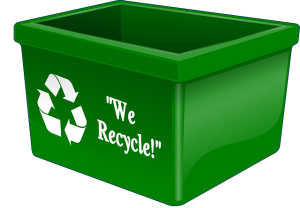Plastic Recycling–did you know?
Plastic bottle caps are recyclable!
- We were taught to take caps off bottles before recycling them. However, plastic used in bottle caps actually holds more value than the plastic in the bottles! Now, almost all plastic recycling companies have equipment to remove caps from bottles. People are encouraged to leave them on when they recycle.
Recycling wrong is almost the same as not recycling
- Don’t put plastic bags in curbside recycling bins! In many areas, all recyclable materials go in the same bin and a machine sorts the materials at the waste management site. These machines were only made to sort certain products. When people put things in the bin that don’t belong there, the machines can get jammed up! Check with your local waste management company to see what is accepted curbside in your area and do your part to make sure to recycle properly. Many products (plastic bags, batteries, ink cartridges, egg cartons) must be taken back to stores in order to be recycled.

Rinsing plastic containers can do a lot of good
- Rinsing plastic before it goes in the recycling bin can make a big difference. Aside from reducing smells and not attracting critters, “clean” plastic requires less time and energy for the recycler to process. This makes your community’s recycling more valuable and can bring big returns back to your community.
It’s more than just Reduce, Reuse, Recycle
- Since the mid-1970’s, “Reduce, Reuse, Recycle!” has defined the worldwide sustainability movement. We now recognize that there are more tools than just the 3 R’s that the average person can use to have a positive environmental impact. These new additions are:
- Rethink! – Sometimes taking just a minute or two to think about how you can do something differently or more efficiently can make a huge difference.
- Refuse! – Recycling isn’t hard, but it’s even easier to just say “No thank you,” and not have to deal with it at all! By declining a straw and lid at a restaurant, refusing plastic cutlery, to-go containers, etc., you can reduce the amount of unnecessary plastic that’s going into the dump.
- Repair! – Another way to help the environment is to fix things when they break instead of replacing them. By extending the life of your products you’re saving money and cutting back on unnecessary waste!

Recycling still isn’t the best option
- Recycling is generally a great way to handle waste. But, recycling still consumes energy and uses valuable natural resources. Recycled plastic products will almost always end up as waste, as recycled plastic is usually non-recyclable. The best option is to not produce the waste at all. If you have to though, always try to use recyclable materials and make sure they get put in the proper place.
Take the pledge!
- You can take a pledge to reduce the amount of plastic waste that you generate.

 0
0
by Maia McGuire

Posted: August 4, 2017
Category:
Conservation, Natural Resources
Tags: Plastic, Recycling


 0
0
